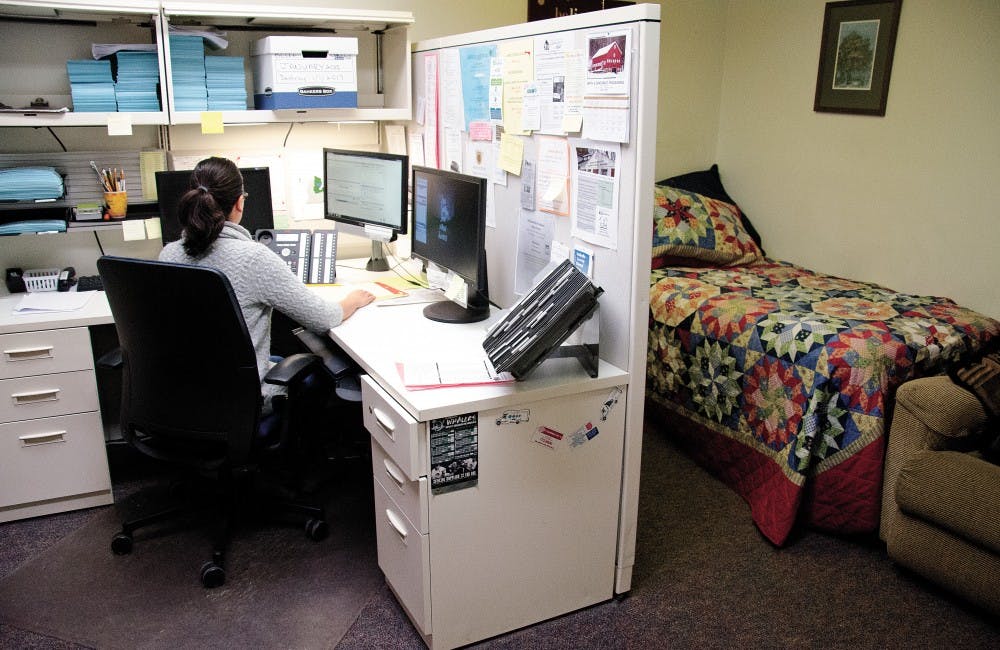Lending an ear
Listening Ear Crisis Center in downtown Mount Pleasant handles needs of Northeast Michigan
“Hello, this is Listening Ear…” said a friendly voice into the receiver. With pen in hand, lips pursed, the counselor is ready to listen to whatever concerns the caller wants to share.
Sitting in a small cubicle, surrounded by walls of papers, organizations, phone numbers and flashing call lights, employees at Listening Ear Crisis Center in downtown Mount Pleasant await the ringing of the phone and the chance to make a difference in someone's life.
In the back room, there is more than just a desk and cubicle. A bed is available for workers who will sleep overnight as they push through a long 16-hour shift. The room is equipped with a TV, Netflix, a microwave and a refrigerator.
Listening Ear's phone lines are statewide, and the organization is aiming to become a nationwide call center, as well as in Canada. Listening Ear takes about 100 calls per night.
Some 176 people have been assisted in finding housing for developmental disabilities and 200 people have been put in affordable housing. Listening Ear has also helped 20 sexually abused children connect with needed counseling and found 42 foster homes for children.
Director of the Listening Ear Crisis Center Kathy Tarrant was one of the founders of the organization. After retiring from working as a juvenile court referee she came "home" to Listening Ear as the director.
"Listening Ear is important in any area and community," Tarrant said. "In a college town, there are unforeseen needs when moving into a new environment. The brain of a student is not yet fully developed and it may be hard for some people to put things into future perspective. Life on campus is definitely a learning experience and Listening Ear is here to help."
After clocking in at 3:30 p.m., workers go over the information from previous shifts, send faxes and discuss any new information, referrals and resources. Every day in the crisis center is unpredictable. The center doesn't only answer calls regarding a student's personal crisis; they answer phones for 211, a health and human services line, and mental health calls after 5 p.m. for multiple counties in northeast Michigan.
It’s close to 5 p.m. and the phones start ringing more frequently. There are two employees answering calls. One of them answers the phone with a formal greeting. She is attentive to the callers questions. She gets out of her seat and goes to a large shelf of binders, where the resources and schedules for many programs are organized.
After finding the correct page, she looks at the schedule of volunteers for laundry. A laundry service for impoverished students is provided through St. John's Episcopal Church. She sets up a time for the caller to be assisted. Often, students do not provide a callback number and it's hard for the workers to verify appointments.
At the same time, the other worker is in the back room answering another student in need. The student explains that rent is due and he doesn't have the money to pay. She points the caller to all of the available programs in the community. Before explaining how to contact the resources and where they should go, she has to speak evenly and keep the caller calm. One program that is available to those struggling with rent is the low and middle income apartments, Horizon West. The crisis center also has a specialized counselor to help with housing issues.
As the day goes on, the phone is almost constantly ringing. The voices on the other end of the lines are eager to receive help. Quite often there is no other place to call for help besides the center. One caller is confused about an appointment and attempts to call the offices at a hospital. After closing hours they are redirected to the Listening Ear phone line.
Most of the calls directed to Listening Ear have to do with mental health concerns. The caller was concerned that she couldn't contact the doctor. The worker had to repeat themselves multiple times during this call to get the correct information across to the caller who was seemingly distressed.
Listening Ear was founded in 1969 as a crisis line for students at Central Michigan University. It became a way for many students and residents of Mount Pleasant to find resources for rent, vehicle repairs and transitional living.
The center relies on funding primarily from United Way, Clare and Isabella county and donations.
Many of the employees at the Crisis Center were CMU students at one time. One graduated four years ago as a psychology major and has been working there since. Her area of expertise is crisis intervention. She finds that being at this organization has its rewards.
"You can make a difference in a life even though it may seem as insignificant as a three minute phone call," she said. As part of the organization's privacy policy, employees are not identified to clients or the public.
The center has seven employees. One student has been working for Listening Ear for about a year. As a sophomore, she has been able to gain experience in her field of social work. Through this job, she found her major had more options than she thought and has verified social work is the career for her, despite the challenges associated with this type of work.
"The hardest part of the job is not knowing what happens after the call. A lot of the time is doesn't end happily or the way you want it to, but you have to be able to let it go. One of the nice things about this job is that some people will call back to let know how things went or how their life has been since the call."




